
Sample Poems
Purchase
So I Will Till The Ground
The memory of [the Armenian genocide] resonated in Gregory Djanikian’s family—for this book is transparently a memoir in verse—and his portrayal of it in the first part of the book makes for tough reading, in no small measure because of the understated, pastoral tone he often employs to detail atrocity…More surprising is how a collection that begins so gut-wrenchingly can segue so smoothly into something so celebratory…And, despite the graphic depiction of the evil that men can do, it manages somehow to give your faith in humanity a palpable boost.
—Frank Wilson, The Philadelphia Inquirer
This is a book about collective memory and cultural haunting, about wounds and responsibilities. Most of all, So I Will Till the Ground is the memorable testimony of one man’s struggle to take joy in the present and believe in the future when the past inspires nothing but distrust, fear, and rage. [It is] a book of unequivocal necessity and chilling truthfulness to history and memory, a luminously crafted, dark incantation.
—Mihaela Moscaliuc, Pleiades
Gregory Djanikian has written a volume of poetry not just to commemorate the horrors of his people, but to show us its culture and provide hope for its preservation. So I Will Till the Ground isn’t just important poetry, it is great poetry. It illuminates Armenian culture and the lives of all kinds of immigrants in American society. This is a volume you should read. It is a volume you’ll be glad to read.
—Alan Jalowitz, WPSU radio
So I Will Till the Ground [is] a book so personal and accessible that it reads like memoir, a book so attentive to the hush and promise of language that it will be forever classified as poetry…It is about surviving among and despite the ghosts of those denied that privilege. It is about the rivers that etch themselves into the earth, and about the rivers—backwards flowing, forward surging—of time.
—Beth Kephart, Pennsylvania Gazette
In a way, it’s hard to say enough good things about the satisfactions of this book: the simple, beautiful language; the balancing of humor and sorrow; the gathering sense of the sacred in memory, tongue, and family, “feeling the history of it on [the] skin,” “eating and tasting again/everything that has already/been written/into the body.” It tells a big story that is also a great story.
—Michael Jennings, Tar River Poetry